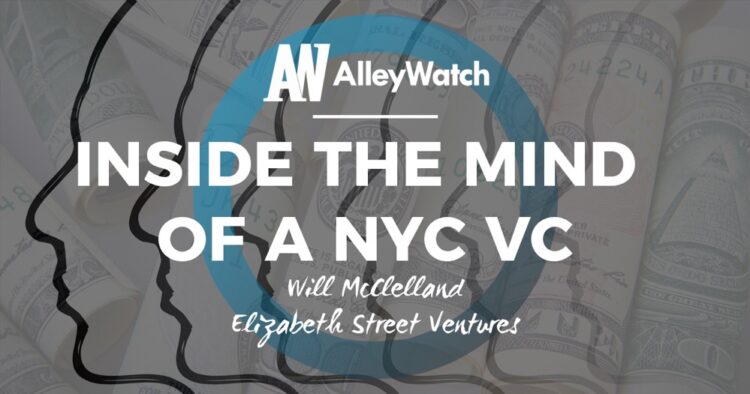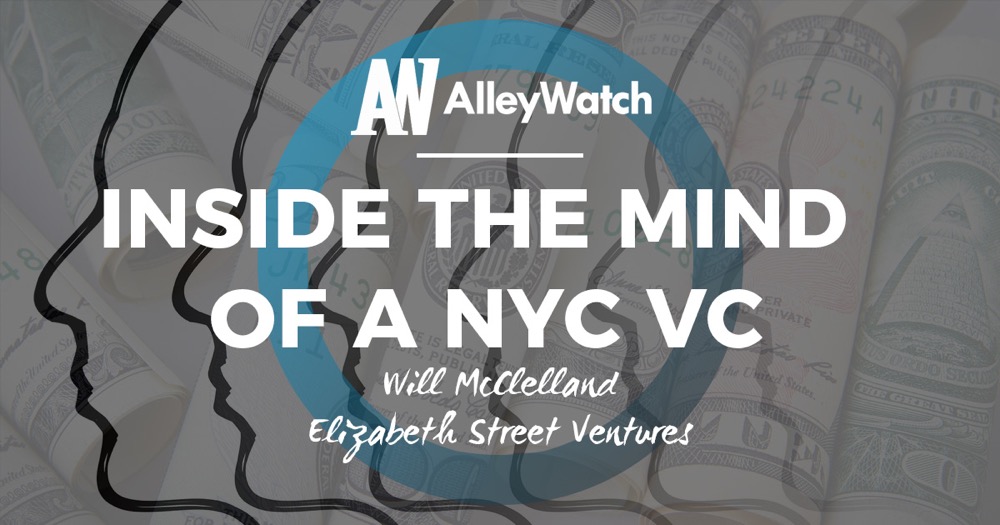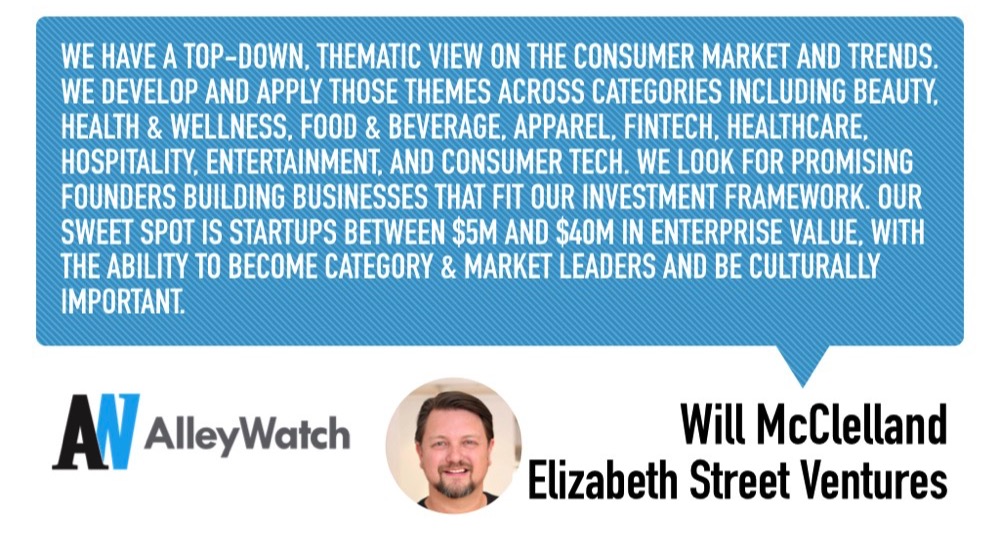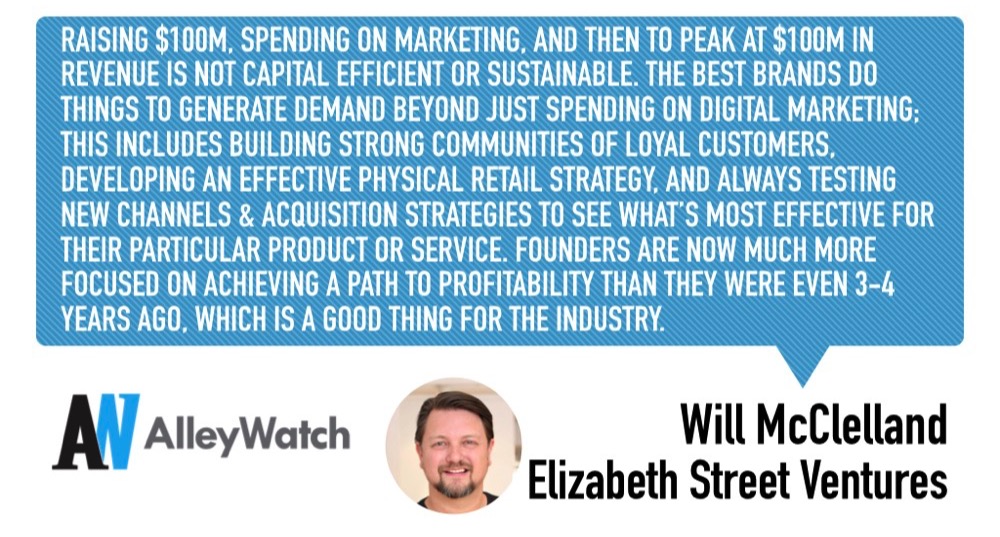Welcome back to Inside the Mind of an NYC VC, a highly acclaimed series at AlleyWatch in which we speak with leading New York City-based Venture Capitalists. In the hot seat this time is Will McClelland, Cofounder and Partner at Elizabeth Street Ventures, the early-stage consumer-focused venture firm, investing out of its inaugural fund. Since its founding in early 2018, Elizabeth Street has backed several promising companies that include Museum of Ice Cream, Fitz Frames, High Court, OROS, and Tiny Organics. Will started his career in venture investing at Grace Beauty Capital and is responsible for investments in leading consumer brands such as ThirdLove, Harry’s, Glamsquad, Birchbox, Eloquii, and MM.Lafleur
We visited Will at his offices in Soho to discuss his journey to venture from the hedge fund industry, trends in the consumer landscape including the rise of the experience economy, investing in women, bridging the funding gap between venture and private equity and much, much more…
If you are a NYC-based VC interested in participating in this series, please send us an email. We’d love to chat. If you are interested in sponsoring this series that showcases the leading minds in venture in NYC, we’d also love to chat. Send us a note.
Reza Chowdhury, AlleyWatch: Please tell us a little bit about your background and how/why you started in venture.
Will McClelland, Elizabeth Street Ventures: I spent the beginning of my career as a tech investment banker at Lehman Brothers in Silicon Valley, and then joined a fund-of-hedge funds called Ironwood Capital Management in San Francisco, which grew from $250Mto $3.5 billion while I was there. I ultimately became the managing director of research and youngest member of the firm’s investment committee.
For eight years in the hedge fund industry I was primarily focused on research, due diligence, sourcing, risk management and portfolio construction, but it wasn’t until my younger brother approached me with an idea to start a bamboo bicycle company based in the Philippines (where we’re dual citizens) that I ever considered backing an entrepreneur or investing in a startup.
The company we co-founded, Bambike, is a social enterprise and our tours are now the #1 rated outdoor activity in Manila on TripAdvisor. The Philippine ambassador to the U.S. gave one of our bikes to President Obama as an official state gift. It was that experience, investing in my brother and helping our company grow from a business plan to improving the livelihoods of an entire village while doing something positive for the environment, that set me down a path and sparked the curiosity and desire to invest in consumer companies full time. I have a dual degree in Anthropology and Economics, and consumer venture is an area that naturally lends itself to both disciplines.
I got my start in venture working with an NYC-based family office called Grace Beauty Capital, sourcing and executing consumer investments, working with a father and son who had invested in companies like Peloton and Warby Parker. As an employee of the family’s beauty distribution company, I got to learn the inner workings of an operating business and at the same time, build a network and investment track record, which includes early investments in companies such as ThirdLove, Rothy’s, Supergoop!, Glamsquad, Harry’s, MM. LaFleur, Parachute Home, and Eloquii. This experience ultimately enabled me to start Elizabeth Street Ventures with my partner Ben, who had previously managed two consumer-focused hedge funds.
 How did working in the funds-of-funds world prepare you for investing in startups?
How did working in the funds-of-funds world prepare you for investing in startups?
I spent eight years interviewing hedge fund managers, analyzing investment businesses, and constructing hedge fund portfolios. Those interview skills are extremely valuable and translate to how I interview startup founders today. Venture is a people business and developing those skills, along with the ability to analyze business models and develop a thematic investment framework, are a huge benefit to investing in startups, especially in early-stage consumer, where I believe the ideal funding model is different from the traditional tech-VC model.
I also wrote our fund’s quarterly investor letters from 2007 to 2012, during the global financial crisis. Being able to distill a lot of complex financial information into a clear narrative is also a huge benefit to being able to think and communicate clearly as an investor.
Being an investor for my entire career has helped me develop a framework tailored specifically to early-stage, high growth consumer businesses. The unique combination of running a research group at a fund-of-funds, to managing a family office venture portfolio inside of a consumer operating business, is a diverse skill set that has helped me be successful as a venture investor.
Tell us more about Elizabeth Street Ventures.
Elizabeth Street is an early-stage investment firm focused on the digital consumer and next-generation brands that elevate daily life. We are a consumer venture fund that fills a white space between traditional tech-focused venture capital firms and larger consumer-focused private equity funds.
We are thematic investors and have a wide aperture looking across consumer categories, including everything from Fintech to Hospitality. We look to back high-growth-potential consumer businesses with great brands and exceptional founding teams.
My partner and cofounder, Ben, ran two $300 million consumer-focused long/short hedge funds before we got together to start Elizabeth Street. Combined, we have decades of experience managing capital, investing in brands, and analyzing a wide range of successful and unsuccessful consumer business models. Ben is a very good short seller, which adds a very interesting dimension to our evaluation process. He is also very active in the art market and there are certain parallels in terms of aesthetics, design and buyer/seller dynamics that translate well over into consumer.
How many deals will Elizabeth Street Ventures invest in a year?
About five deals per year and we write checks between $250k and $2M.
Is there a specific investment thesis that Elizabeth Street Ventures deploys? Where is the firm’s sweet spot?
We have a top-down, thematic view on the consumer market and trends. We develop and apply those themes across categories including Beauty, Health & Wellness, Food & Beverage, Apparel, FinTech, Healthcare, Hospitality, Entertainment, and Consumer Tech. We look for promising founders building businesses that fit our investment framework. Our sweet spot is startups between $5M and $40M in enterprise value, with the ability to become category & market leaders and be culturally important.
What does consumer-focused mean to you?
Finding great brands that we can work with, help scale and be proud of.
The firm has made investments in some businesses that are outside the typical scope of venture capital – like the firm’s recent investment in The Museum of Ice Cream. What’s the thinking behind these types of investments?
There are many entrepreneurs in the consumer space that aren’t perfect fits for the traditional tech-VC model. Many of these businesses would be interesting to growth private equity firms but may be too early in their development. We’re filling that gap and Museum of Ice Cream is a perfect example of this.
Museum of Ice Cream/Figure8 is an experiential entertainment production company, outside the box for a lot of tech investors, but exactly the type of opportunity we love and fits within one of our core themes: the growth of the Experience Economy and turnover of traditional retail models accompanied by falling commercial rents. We have a similar investment in a contemporary membership club concept called Highcourt that plays to this theme but in Hospitality.
Elizabeth Street Ventures’s HQ is based right on Broadway in Soho to be close to many of your portfolio companies that have retail presences nearby.
We named our firm Elizabeth Street and located it right on Broadway and Canal because Soho is the most dynamic neighborhood for commerce in the country. Everything exciting in branded consumer is happening right here and that’s the ecosystem we want to be in. Despite the massive growth in digital commerce, consumers still want to experience brands in real life and Soho is one of the best places, perhaps in the world, to do that. Brands are smart to have a considered physical retail strategy and want to group themselves in proximity to other great brands where consumers can have an enjoyable shopping experience. I wish the next mayor would consider making it a pedestrian-only walking neighborhood, it would do wonders for the street life and retail here.
We named our firm Elizabeth Street and located it right on Broadway and Canal because Soho is the most dynamic neighborhood for commerce in the country. Everything exciting in branded consumer is happening right here and that’s the ecosystem we want to be in. Despite the massive growth in digital commerce, consumers still want to experience brands in real life and Soho is one of the best places, perhaps in the world, to do that. Brands are smart to have a considered physical retail strategy and want to group themselves in proximity to other great brands where consumers can have an enjoyable shopping experience. I wish the next mayor would consider making it a pedestrian-only walking neighborhood, it would do wonders for the street life and retail here.
A large portion of the Elizabeth Street Ventures’ portfolio is female-founded. Is this deliberate? Why is this diversity important?
I’ve made about 30 venture and angel investments and over half of those companies have female founders. It wasn’t deliberate initially. It was more a function of those were the best and most compelling founders/opportunities to back in the areas I was interested in. Once I had a bit of a track record, that became extremely valuable for word-of-mouth referrals to more female founders building great companies, which today is a big and important part of my network.
New York is a very supportive ecosystem for female founders and we are proud to be a part of that. Balance is super important and we want to back the best brands across a wide array of categories with a diverse group of entrepreneurs. We know that female founders will drive some of the best investment returns for the portfolio.
What do you need to see from teams, both qualitatively and quantitatively, in order to invest specific to consumer-focused companies? What is one thing that many founders are missing, not emphasizing enough, or not aware of when pitching you?
Qualitatively I look for insight and magnetism. A founder needs to have a special insight about their market and possess a magnetic quality that can attract customers/employees/investors to their mission in order for us to gain conviction about any investment.
Quantitatively, each business is different, but generally, we look for signals that show they can generate demand and be differentiated in a big enough market where there are natural acquirers. We like to help fund that first big upswing in growth trajectory. My advice to founders is to have a very realistic sense of market size and tailor your fundraising strategy accordingly.
You’ve invested in a number of companies that have done extremely well (Glamsquad, MM. LaFleur, Rothy’s, Harry’s, ELOQUII, ThirdLove). Have you observed any recurring patterns or themes that are common to these ventures?
ThirdLove, Rothy’s and Harry’s all had technical elements around product construction that were difficult to replicate. MM. LaFleur and Eloquii were going after underserved market segments and Glamsquad was creating an entirely new service model. Aside from Harry’s, they were all catering to the same Millennial female demographic with a superior product, service, and experience than what already existed in the market.
In the consumer space, there has been a propensity for companies to raise, spend on unsustainable acquisition channels with poor economics to just get to the next milestone and hopeful round of funding. It’s been said that >40% of venture dollars are being spent on paid social and Google AdWords. Can this continue? How will this pan out in the future for consumer companies?
This is why we try to coach founders to have realistic growth expectations and translate that into their capital raising strategy. Raising $100M, spending on marketing, and then to peak at $100M in revenue is not capital efficient or sustainable. The best brands do things to generate demand beyond just spending on digital marketing; this includes building strong communities of loyal customers, developing an effective physical retail strategy, and always testing new channels & acquisition strategies to see what’s most effective for their particular product or service. Founders are now much more focused on achieving a path to profitability than they were even 3-4 years ago, which is a good thing for the industry.
In that spirit, what’s an overlooked channel that consumer companies should be focusing on for growth and customer acquisition?
Print media. Radio. Out-of-home. Amazon. Traditional retail – it depends on the product. For example, Untuckit was advertising on ESPN radio, in WSJ print and in airline magazines when DTC competitors were mostly spending on Facebook. Brands have to be creative and find the channels that are most appropriate to their target customer base. Digital spend will remain important, but you shouldn’t build a marketing strategy that’s entirely dependent on Facebook and Instagram.
What is one thing that many founders are missing, not emphasizing enough, or not aware of when pitching you?
This is less about us specifically, and more about pitching funds in general, but founders should know that tech VCs have very different loss rate expectations than growth PE funds. The VC model assumes some number of companies in the portfolio will go to zero and they, therefore, tend to push for outsized returns. In contrast, growth PE investors want none of their companies to go to zero and have more moderate return expectations in the 3X-5X range. Consumer entrepreneurs should be aware that their business models sometimes blur the lines between VC and PE. Founders should be aware of the growth expectations that Series A and Series B investors will have when considering their fundraising strategy.
This is less about us specifically, and more about pitching funds in general, but founders should know that tech VCs have very different loss rate expectations than growth PE funds. The VC model assumes some number of companies in the portfolio will go to zero and they, therefore, tend to push for outsized returns. In contrast, growth PE investors want none of their companies to go to zero and have more moderate return expectations in the 3X-5X range. Consumer entrepreneurs should be aware that their business models sometimes blur the lines between VC and PE. Founders should be aware of the growth expectations that Series A and Series B investors will have when considering their fundraising strategy.
As the New York tech ecosystem has evolved over the last few years, access to capital has improved for founders but not all capital is the same. What should entrepreneurs be looking for in an investor?
First off, look for investors you can see yourself being in business with for the next ten years. Find investors who share your values and where there is alignment about growth expectations for the business. If you can find investors with great networks in your industry and who can add strategic value, add as many of those investors as you can. Also, don’t just go with the investor who is willing to give you a term sheet with the highest valuation.
Finish this sentence – in 10 years, the NYC Startup ecosystem will be…
…the most dynamic in the world.
When you put on your headphones and need to get head down in something, what are you listening to?
Grateful Dead
What’s your favorite restaurant in the City?
Rubirosa
You’re the cofounder of a Bamboo bicycle and ecotourism company in the Philippines but where’s the best place to bike in and around NYC?
Brooklyn & Prospect Park






